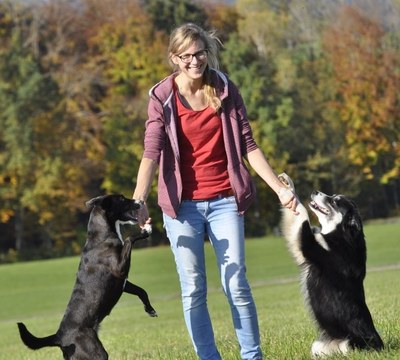Dr. Désirée Brucks |
 |
|
Mail: |
desiree.brucks@hu-berlin.de |
|
| Telefon: | + 49 30 2093 46934 | |
| ORCID: | 0000-0003-3146-5110 | |
| Research Gate: | https://www.researchgate.net/profile/Desiree_Brucks | |
| Google Scholar: | https://scholar.google.com/citations?hl=de&user=_xHumxIAAAAJ | |
Werdegang
| Seit 2023 |
PostDoc, Tierhaltungssysteme und Ethologie, Thaer-Institut für Agrar- und Gartenbauwissenschaften, Humboldt-Universität zu Berlin |
| 2020-2023 |
PostDoc, Abteilung Tierhaltung und Haltungsbiologie, Institut für Tierzucht und Haustiergenetik, Justus-Liebig-Universität Gießen, Deutschland |
| 2019-2020 |
PostDoc, Institut für Agrarwissenschaften, ETH Zürich, Schweiz |
| 2018-2019 |
PostDoc, Gruppe für Vergleichende Kognitionsforschung, Max-Planck-Institut für Ornithologie, Seewiesen, Deutschland |
| 2013-2017 |
Ph.D. Vergleichende Kognitionsforschung, Messerli Research Institut, Veterinärmedizinische Universität Wien, Österreich |
| 2010-2012 |
M.Sc. Verhaltensbiologie, Georg-August-Universität Göttingen, Deutschland |
| 2007-2010 |
B.Sc. Biologie, Georg-August-Universität Göttingen, Deutschland |
Publikationen
Pahl A, König von Borstel U & Brucks D (2023) Llamas use social information from conspecifics and humans to solve a spatial detour task. Animal Cognition 16: 1623-1633.
Brucks D, Petelle M, von Bayern A, Krasheniinikova A (2023) On the role of training in delay of gratification paradigms: a reply to Pepperberg 2022. Animal Cognition 26: 721-726.
Brucks D, Härterich A, & König von Borstel U. (2022) Horses wait for better and more rewards in a delay of gratification test. Frontiers in Psychology, 13:954472.
Brucks D, Drews B & Ulbrich S. (2022) Exploring the social network of captive roe deer (Capreolus capreolus). Applied Animal Behaviour Science, 246: 105526.
Brucks D, Petelle M, Baldoni C, Krasheninnikova A, Rovegno, E, & von Bayern AMP. (2021) Intra-and interspecific variation in self-control capacities of parrots in a delay of gratification task. Animal Cognition, 25(2):473–491.
McGetrick J, Brucks D, Marshall-Pescini S & Range F. (2020) No evidence for a relationship between breed cooperativeness and inequity aversion in dogs. PLoS One, 15 (6), e0233067.
Range F, Brucks D & Virányi Z. (2020) Dogs wait longer for better rewards than wolves in a delay of gratification task: but why? Animal Cognition, 23, 443-453.
Brucks D & von Bayern A. (2020) Parrots voluntarily help each other to obtain food rewards. Current Biology, 30, 292-297.
Krasheninnikova A, Brucks D, Buffenoir N, Rivas Blanco D, Soulet D & von Bayern A. (2019) Parrots do not show inequity aversion in a modified token exchange paradigm. Scientific Reports, 9, 16416.
Krasheninnikova A, Brucks D, Blanc S & von Bayern A. (2019) Assessing African grey parrots’ prosocial tendencies in a token choice paradigm. Royal Society Open Science, 6, 190696.
Tassin de Montaigu C, Durdevic K, Brucks D, Krasheninnikova A & von Bayern A. (2019) Blue-throated macaws (Ara glaucogularis) succeed in a cooperative task despite coordinating their actions. Ethology, 126, 267-277.
Brucks D, Marshall-Pescini S & Range F. (2018) Dogs and wolves do not differ in their inhibitory control abilities in a non-social test battery. Animal Cognition, 22, 1-15.
Brucks D, Marshall-Pescini S & Range F. (2017) Dogs’ reaction to inequity is affected by inhibitory control. Scientific Reports, 7, 15802.
Brucks D, Marshall-Pescini S, Wallis L, Huber L & Range F. (2017). Measures of dogs’ inhibitory control abilities do not correlate across tasks. Frontiers in Psychology, 8, 849.
Brucks D, Soliani M, Range F & Marshall-Pescini S. (2017). Reward type and behavioural patterns predict dogs’ success in a delay of gratification task. Scientific Reports, 7, 42459.
Brucks D, Marshall-Pescini S, Essler JL, McGetrick J, Huber L & Range F. (2017) What are the ingredients for an inequity paradigm? Manipulating the experimenter’s involvement in an inequity task with dogs. Frontiers in Psychology, 8, 270.
Brucks D, Essler JL, Marshall-Pescini S & Range F. (2016). Inequity aversion negatively affects tolerance and contact-seeking behaviours towards partner and experimenter. PLoS One 11(4): e0153799.

